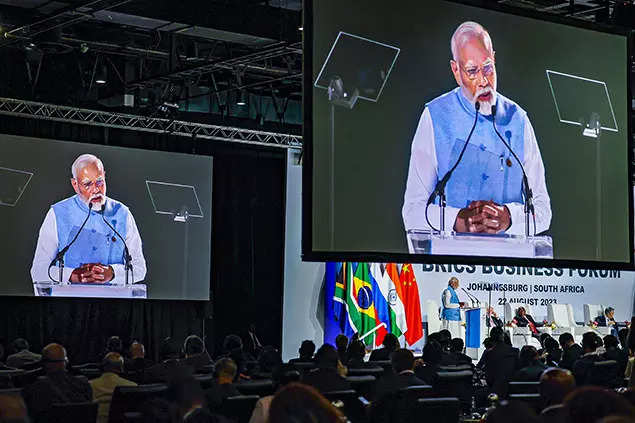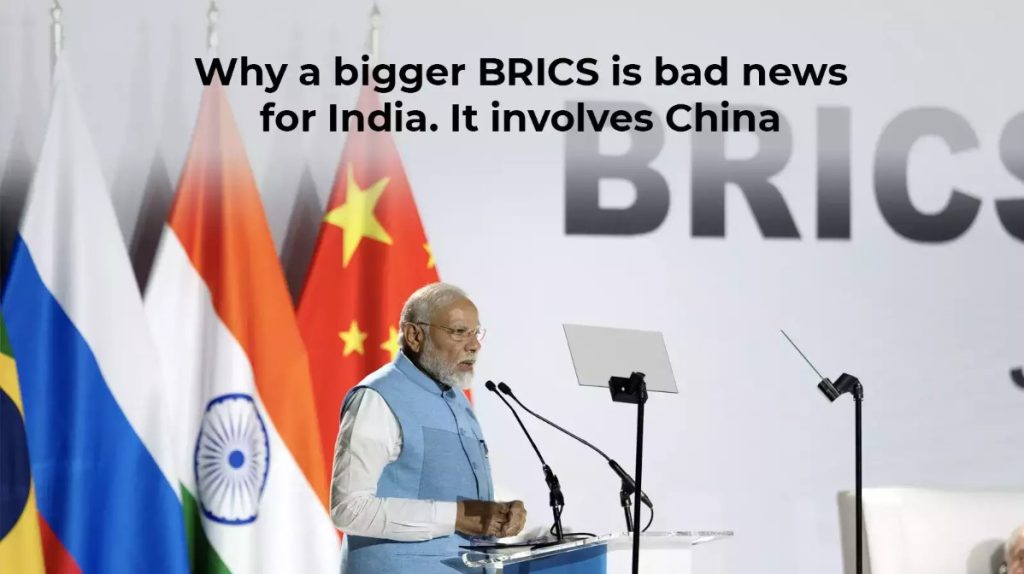India must foil the grouping’s expansion that would make expansionist China dominant
The three-day BRICS summit in Johannesburg, South Africa, that started on August 22 will discuss many things. It will, however, focus on membership expansion from five members —Brazil, Russia, India, China, South Africa — to a much larger group.
South Africa has invited 67 countries to the summit of which 53 are African. South Africa hopes to ultimately make BRICS an African-majority group. Where it can claim to be the leader.
China strongly favours expansion, seeing a chance to convert BRICS into an anti-Western front by inducting countries dependent on Chinese aid and investment. This is a major threat to Indian interests that must be combated.
BRICS was invented by Goldman Sachs as a group that global investors should invest in, and it was little more than an investment fad. These were the five emerging markets with the largest populations — and, hence, political influence — in four continents.
South Africa has invited 67 countries to the summit of which 53 are African. South Africa hopes to ultimately make BRICS an African-majority group. Where it can claim to be the leader.
China strongly favours expansion, seeing a chance to convert BRICS into an anti-Western front by inducting countries dependent on Chinese aid and investment. This is a major threat to Indian interests that must be combated.
BRICS was invented by Goldman Sachs as a group that global investors should invest in, and it was little more than an investment fad. These were the five emerging markets with the largest populations — and, hence, political influence — in four continents.

The countries in question found the acronym irresistible. So, BRICS became a political group. Its main achievement has been the creation of the New Development Bank (NDB), which finances infrastructure projects.
This has made billions of dollars of loans. But they add up to a pinprick in global finance. However, this helps expand China’s Belt and Road Initiative (BRI).
Chinese imperial ambitions are not in doubt. At a 2010 Association of Southeast Asian Nations (Asean) regional forum meeting in Hanoi, Vietnam, Chinese foreign minister Yang Jiechi bluntly declared that Asean members were small countries and China was a big country, and that was simply a fact of life.
To combat these dangers, Indian diplomats must keep the following points in mind at the BRICS summit:
➤ Oppose reckless expansion in search of numbers. The Non-Aligned Movement (NAM) began with a few members focused on creating independent space for the non-aligned. But the membership ultimately expanded to include everybody from Cuba, a Soviet military ally, to Singapore, a US military ally. In search of numbers, NAM lost all ideological coherence.
Do not let BRICS be converted into a sort of NAM or even G-77, where it will have little voice. The smaller the membership, the better off India will be. Pakistan must be kept out, whatever China’s pressure.
➤ Chinese domination of BRICS must be checked at every instance. China was just another developing country when BRICS was formed. Today, it is a superpower, senior partner of even Russia. Indian diplomats are dismayed that Russia, once a reliable Indian friend, has become a Chinese proxy.
These two countries would like to convert BRICS into an anti-Western front. India, with the assistance of Brazil, must oppose this.
➤ India could use this issue to improve its chances of entering the UN Security Council. China has opposed this, and so have countries such as Egypt and Argentina. India could oppose or veto such naysayers.
This has made billions of dollars of loans. But they add up to a pinprick in global finance. However, this helps expand China’s Belt and Road Initiative (BRI).
Chinese imperial ambitions are not in doubt. At a 2010 Association of Southeast Asian Nations (Asean) regional forum meeting in Hanoi, Vietnam, Chinese foreign minister Yang Jiechi bluntly declared that Asean members were small countries and China was a big country, and that was simply a fact of life.
To combat these dangers, Indian diplomats must keep the following points in mind at the BRICS summit:
➤ Oppose reckless expansion in search of numbers. The Non-Aligned Movement (NAM) began with a few members focused on creating independent space for the non-aligned. But the membership ultimately expanded to include everybody from Cuba, a Soviet military ally, to Singapore, a US military ally. In search of numbers, NAM lost all ideological coherence.
Do not let BRICS be converted into a sort of NAM or even G-77, where it will have little voice. The smaller the membership, the better off India will be. Pakistan must be kept out, whatever China’s pressure.
➤ Chinese domination of BRICS must be checked at every instance. China was just another developing country when BRICS was formed. Today, it is a superpower, senior partner of even Russia. Indian diplomats are dismayed that Russia, once a reliable Indian friend, has become a Chinese proxy.
These two countries would like to convert BRICS into an anti-Western front. India, with the assistance of Brazil, must oppose this.
➤ India could use this issue to improve its chances of entering the UN Security Council. China has opposed this, and so have countries such as Egypt and Argentina. India could oppose or veto such naysayers.

L-R: Brazil President Luiz Inacio Lula da Silva, China President Xi Jinping, South Africa President Cyril Ramaphosa, Prime Minister Narendra Modi and Russia’s foreign minister Sergei Lavrov at the BRICS Business Forum in Johannesburg (Photo: AFP)
China wants BRICS to become the champion of the global South. Through this, it seeks another vehicle for imperial domination.
India has ambitions of its own, and must not hesitate to block the entry of pro-Chinese members. China may accuse India of submitting to the West. India should reply that it seeks space independent of all powers, including the US and China.
Why nations want to join BRICS
Why do so many developing countries want to join BRICS? Well, their current groupings have not helped much in relieving their plight. They did, indeed, record impressive economic growth in the 2000s, when China became the global economic locomotive.
Then came the debt crisis of 2008-09. More recently, China has slowed considerably, global growth and trade are shrinking, and both Covid and the Ukraine war have taken a heavy toll on economies.
India has ambitions of its own, and must not hesitate to block the entry of pro-Chinese members. China may accuse India of submitting to the West. India should reply that it seeks space independent of all powers, including the US and China.
Why nations want to join BRICS
Why do so many developing countries want to join BRICS? Well, their current groupings have not helped much in relieving their plight. They did, indeed, record impressive economic growth in the 2000s, when China became the global economic locomotive.
Then came the debt crisis of 2008-09. More recently, China has slowed considerably, global growth and trade are shrinking, and both Covid and the Ukraine war have taken a heavy toll on economies.

PM Modi at the BRICS Business Forum Leaders’ Dialogue in Johannesburg. India must not let BRICS be converted into a sort of NAM or even G-77, where it will have little voice (Photo: PTI)
Many African countries feel their interests were ignored during the pandemic when the West focused only on its own. Many of them have rejected the West’s version of the Ukraine war as supporting a small democracy attacked by a big autocracy.
They either do not care for far-off wars, or think this is a continuation of the Cold War, a conflict in which they were non-aligned or sympathised with the Soviet Union. Many are grateful for Chinese aid, which far exceeded what they could get from Western sources.
In a recent article, Indrani Bagchi, one of my favourite columnists, argued that the decks are stacked against India in BRICS. I am not so sure. India has so far insisted on rules-based criteria for new entrants. This should include a veto for any of the original five members. India should argue against rapid membership expansion that converts BRICS into a sort of G-77 that achieved so little for developing countries in the last five decades.
They either do not care for far-off wars, or think this is a continuation of the Cold War, a conflict in which they were non-aligned or sympathised with the Soviet Union. Many are grateful for Chinese aid, which far exceeded what they could get from Western sources.
In a recent article, Indrani Bagchi, one of my favourite columnists, argued that the decks are stacked against India in BRICS. I am not so sure. India has so far insisted on rules-based criteria for new entrants. This should include a veto for any of the original five members. India should argue against rapid membership expansion that converts BRICS into a sort of G-77 that achieved so little for developing countries in the last five decades.

Chinese President Xi Jinping. China wants to convert BRICS into an anti-Western front by inducting countries dependent on Chinese aid and investment (Photo: Reuters)
Finally, India should argue strenuously for forgiving unpayable debts to the World Bank and International Monetary Fund (IMF). World Bank chief economist Indermit Gill has declared that case-by-case debt relief is totally inadequate and mass debt forgiveness — as in the heavily indebted poor countries (HIPC) debt cancellation in the 2000s — is the way forward.
For this to work, China would also have to agree to write off huge loans, and it is reluctant to do so.
India should position itself as a proponent of debt forgiveness that China is frustrating.
For this to work, China would also have to agree to write off huge loans, and it is reluctant to do so.
India should position itself as a proponent of debt forgiveness that China is frustrating.
This article was originally published by The Times of India on August 23, 2023.


